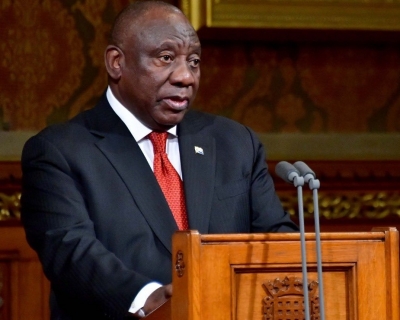During a conversation with President Cyril Ramaphosa, Zelensky expressed his readiness to engage in talks with Russian President Vladimir Putin, despite his concerns that Moscow continues to stall negotiations…reports Asian Lite News
Ukrainian President Volodymyr Zelensky has called on South Africa to play a more visible role in international efforts to end the war with Russia, saying that the Global South must send “relevant signals” in favour of peace.
During a telephone conversation on Saturday with President Cyril Ramaphosa, Zelensky expressed his readiness to engage in talks with Russian President Vladimir Putin, despite his concerns that Moscow continues to stall negotiations.
The discussion between the two leaders underscores Pretoria’s increasingly delicate diplomatic balancing act, as South Africa seeks to maintain strong ties with its BRICS partner Russia while responding to pressure from Western allies to adopt a firmer stance on the war in Ukraine.

Zelensky, in a statement shared on social media platform X, said he had updated Ramaphosa on recent diplomatic efforts in Washington, including his meetings with former United States President Donald Trump. “I reaffirmed my readiness for any format of meeting with the head of Russia. However, we see that Moscow is once again trying to drag everything out even further. It is important that the Global South sends relevant signals and pushes Russia toward peace,” he said.
The appeal to South Africa is significant. As a leading voice within BRICS and a nation that has historically positioned itself as an advocate for global peace and mediation, Pretoria is viewed by both Kyiv and Moscow as a potential bridge to wider engagement with Africa.
Since Russia’s invasion of Ukraine in February 2022, South Africa has adopted what it calls a “non-aligned” position. The government has resisted joining Western sanctions against Moscow, arguing that it prefers dialogue over isolation.
This approach, however, has sparked criticism at home and abroad. Opposition parties, particularly the Democratic Alliance, have accused the ruling African National Congress (ANC) of being too sympathetic towards Russia, citing the country’s longstanding ties dating back to the anti-apartheid struggle when Moscow supported liberation movements.
Ramaphosa has also faced uncomfortable scrutiny over South Africa’s military and economic links with Russia. Last year, Pretoria was placed under the spotlight when the United States accused it of secretly supplying arms to Moscow — an allegation the government denied after a judicial inquiry found no conclusive evidence.
Against this backdrop, Zelensky’s call carries added weight. Analysts suggest that if South Africa were to take a clearer position in urging Moscow to come to the negotiating table, it could embolden other African states to follow suit.
“South Africa enjoys credibility in both the West and in the Global South. Its voice matters,” said Professor Siphamandla Zondi, an international relations expert at the University of Johannesburg. “If Ramaphosa were to publicly signal support for renewed peace talks, that could shift the dynamics and demonstrate Africa’s capacity to shape outcomes in global conflicts.”
Zelensky’s outreach to Ramaphosa is part of a broader strategy to engage African nations, many of which have resisted taking sides in the conflict. Ukraine has repeatedly argued that the war has global consequences, particularly for food security, as disruptions in grain exports from the Black Sea have hit African economies hard.
In June 2023, Ramaphosa led a delegation of African leaders to both Kyiv and St Petersburg, presenting a peace proposal that called for de-escalation, prisoner exchanges and unimpeded grain exports. While neither side accepted the plan outright, the initiative was seen as a rare attempt by Africa to intervene in a major European conflict.
Zelensky’s latest comments suggest he sees value in reviving that African-led push, but with a sharper emphasis on pressuring Russia to act. “The Global South must send relevant signals and push Russia toward peace,” he stressed.
The conversation between Zelensky and Ramaphosa came as geopolitical manoeuvring around the war intensified. On Friday, US President Donald Trump threatened to impose sanctions on Russia if there was no progress towards peace within two weeks. His warning followed a cordial meeting with Putin in Alaska last week, which drew criticism from Kyiv.
Meanwhile, Russian Foreign Minister Sergey Lavrov dismissed the possibility of a summit with Zelensky, accusing him of rejecting every proposal put forward by Moscow.
Zelensky has also sought to reinforce solidarity with European allies. On Saturday, he marked the anniversary of the 1989 Baltic Way — a mass demonstration for freedom across Lithuania, Latvia and Estonia — praising the Baltic states’ continued support for Ukraine against what he described as “dumb Russian imperialism”.
For Ramaphosa, the conversation with Zelensky highlights the growing expectations on South Africa to use its influence constructively. While Pretoria has consistently called for dialogue, it has rarely issued direct pressure on Moscow.
Diplomatic observers say Ramaphosa could use his position within BRICS and the African Union to rally broader Global South backing for peace. But any shift towards Kyiv could strain ties with Moscow, which remains a major economic and political partner.
“The government faces a difficult choice,” said political analyst Melanie Verwoerd. “On one hand, it wants to be seen as a champion of peace and multilateralism. On the other, it cannot risk alienating Russia, given the history and strategic relationship. Zelensky’s call is a reminder that fence-sitting will not be sustainable forever.”
For now, South Africa has not released details of its conversation with Zelensky. But the Ukrainian president’s decision to publicly disclose the call — and to frame it as part of his effort to mobilise the Global South — ensures that Pretoria’s role in the next phase of peace diplomacy will be closely watched.













